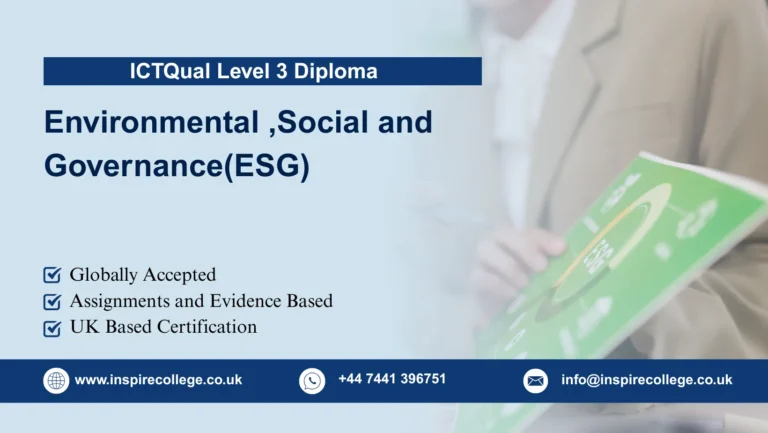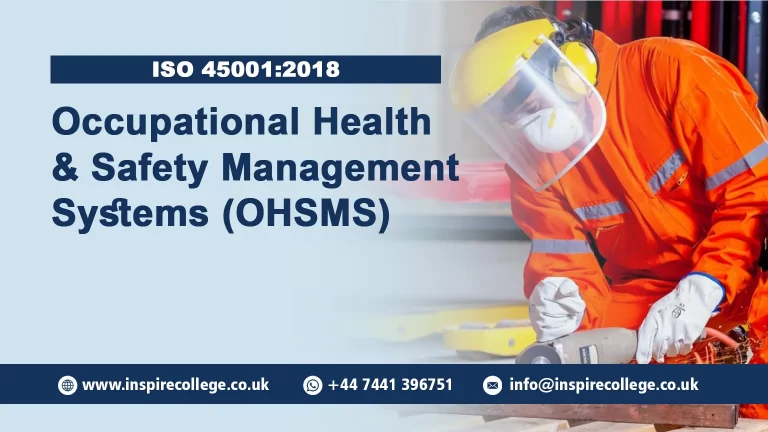
ICTQual Level 7 Diploma in Leadership and Management for Journalists
The ICTQual Level 7 Diploma in Leadership and Management for Journalists is a prestigious, advanced qualification designed for learners aspiring to reach the top levels of media leadership. This programme equips participants with strategic, operational, and editorial management skills required to lead complex media organisations, drive innovation, and make impactful decisions in today’s dynamic journalism and communication environments.
Structured as a 120-credit hour programme, the course combines theoretical frameworks with practical applications, enabling learners to develop expertise in leadership, governance, organisational performance, and strategic media management. Participants gain a deep understanding of ethical decision-making, stakeholder engagement, digital transformation, and emerging media trends, while also enhancing critical thinking, problem-solving, and professional communication skills.
The diploma is suitable for both emerging leaders looking to step into senior media roles and experienced media professionals aiming to elevate their career trajectory. Graduates are prepared to manage editorial teams, oversee content strategy, implement organisational change, and lead innovative media projects across print, digital, and broadcast platforms.
Key benefits of the programme include the development of high-level managerial competence, strengthened professional credibility, and enhanced strategic decision-making abilities. Learners also acquire transferable leadership skills applicable across global media and communication sectors. Upon completion, graduates are well-positioned for senior positions such as media director, editor-in-chief, communications strategist, or consultancy roles, making significant contributions to the growth, innovation, and excellence of modern journalism.
To ensure learners are fully prepared for the programme, the following entry requirements apply:
- Age Requirement:
Learners should be 21 years or older at the time of enrolment. - Educational Background:
Applicants are expected to hold a Level 6 qualification or equivalent, such as a bachelor’s degree, Level 6 diploma, or a relevant professional qualification in journalism, media, communication, or management. Candidates with substantial professional experience in senior media or communications roles may also be considered. - Work Experience:
While not mandatory, it is recommended that learners have 3–5 years of professional experience in media, journalism, communications, or management roles. This helps learners relate theoretical concepts to real-world leadership challenges. - English Language Proficiency:
Since the programme is delivered in English, learners must demonstrate strong English skills. This can be through:
- A recognised Level 2 or higher English qualification, or
- Evidence of professional work or study in an English-speaking environment.
These entry requirements ensure learners are well-prepared to engage with advanced leadership, strategic management, and editorial decision-making concepts, making the programme suitable for both emerging and experienced media professionals seeking senior roles.
Mandatory Units
This qualification, the ICTQual Level 7 Diploma in Leadership and Management for Journalists, consists of 6 mandatory units.
- Strategic Leadership and Executive Management in Journalism
- Advanced Ethical Decision-Making and Governance for Media Leaders
- Organisational Change and Innovation in Newsroom Operations
- Global Media Strategy and Stakeholder Engagement
- Advanced Media Law, Compliance, and Risk Management
- Performance Evaluation, Mentoring, and Leadership Development in Journalism
Learning Outcomes for the ICTQual Level 7 Diploma in Leadership and Management for Journalists:
Strategic Leadership and Executive Management in Journalism
- Develop advanced strategic planning skills to lead complex media organisations effectively.
- Apply executive decision-making techniques in fast-paced newsroom environments.
- Analyse organisational structures and optimise workflows for maximum operational efficiency.
- Demonstrate the ability to manage resources and budgets in large media organisations.
- Foster a culture of innovation, collaboration, and professional accountability within teams.
- Evaluate leadership styles and their impact on newsroom performance and team morale.
- Integrate critical thinking and problem-solving approaches to address complex media challenges.
- Lead high-level projects and initiatives that align with organisational objectives.
Advanced Ethical Decision-Making and Governance for Media Leaders
- Understand and apply ethical frameworks in complex editorial and managerial scenarios.
- Evaluate governance structures and their impact on media operations and organisational integrity.
- Develop policies and procedures to ensure ethical compliance across teams and departments.
- Identify and mitigate conflicts of interest within editorial and managerial roles.
- Assess the social, cultural, and political impact of media decisions on diverse audiences.
- Promote transparency and accountability in decision-making processes.
- Encourage responsible leadership practices and uphold professional journalistic standards.
- Implement frameworks for ethical risk assessment and organisational compliance.
Organisational Change and Innovation in Newsroom Operations
- Analyse current newsroom operations and identify areas for strategic improvement.
- Lead initiatives to implement organisational change and foster innovation.
- Apply change management principles to ensure smooth transitions within teams.
- Promote a culture of creativity, continuous improvement, and adaptability.
- Evaluate the impact of new technologies and processes on operational performance.
- Coordinate cross-functional teams to achieve strategic objectives.
- Develop practical solutions to overcome operational challenges.
- Monitor and assess the success of change initiatives and innovation strategies.
Global Media Strategy and Stakeholder Engagement
- Develop strategic plans that align with global media trends and audience expectations.
- Identify and analyse key stakeholders in media operations and communication networks.
- Build effective communication and engagement strategies for diverse audiences.
- Apply negotiation and influence techniques to strengthen professional relationships.
- Utilise market analysis to inform content strategy and organisational decisions.
- Lead international projects and collaborations within media environments.
- Monitor stakeholder feedback and adapt strategies to maximise impact.
- Promote organisational objectives while maintaining ethical and professional standards.
Advanced Media Law, Compliance, and Risk Management
- Apply comprehensive knowledge of national and international media laws in decision-making.
- Identify legal and regulatory risks associated with journalism and media operations.
- Develop strategies for organisational compliance with media legislation.
- Advise editorial and management teams on legal obligations and risk mitigation.
- Analyse case studies to enhance understanding of complex media law scenarios.
- Implement policies to protect intellectual property, data privacy, and copyright.
- Monitor compliance frameworks and adapt them to evolving legal environments.
- Promote a culture of legal awareness and proactive risk management within media teams.
Performance Evaluation, Mentoring, and Leadership Development in Journalism
- Design and implement effective performance evaluation systems for newsroom teams.
- Provide constructive feedback to improve individual and team performance.
- Develop mentoring programmes to support professional growth and leadership skills.
- Identify talent and succession planning opportunities within media organisations.
- Foster a culture of continuous learning, coaching, and professional development.
- Evaluate leadership competencies and implement strategies for improvement.
- Promote teamwork, motivation, and engagement across diverse teams.
- Assess organisational outcomes and align leadership development initiatives with strategic goals.
The ICTQual Level 7 Diploma in Leadership and Management for Journalists is designed for learners who aspire to take on senior leadership and management roles within the media and journalism industry. It is ideal for individuals who want to combine professional expertise with strategic and executive skills to drive innovation, manage teams, and influence organisational success.
This course is particularly suitable for:
- Emerging Media Leaders – Professionals who are preparing to step into senior editorial or managerial roles and want to gain advanced knowledge in leadership, strategic planning, and organisational performance.
- Experienced Media Professionals – Individuals already working in journalism, media, or communications who want to enhance their leadership capabilities and consolidate their expertise at a higher management level.
- Media Directors and Editors-in-Training – Learners aiming to oversee editorial teams, manage content strategy, and implement organisational change across print, digital, or broadcast platforms.
- Communications Strategists and Consultants – Professionals seeking to provide consultancy services, advisory roles, or strategic media guidance, benefiting from a qualification that supports decision-making and stakeholder management.
- Entrepreneurs in Media and Communications – Those planning to launch or manage media enterprises and requiring advanced knowledge of leadership, governance, and strategic management to succeed in competitive markets.
Overall, this programme is tailored for ambitious, strategic, and globally minded learners who want to lead media organisations with confidence, ethical responsibility, and innovation, contributing meaningfully to the evolution and excellence of modern journalism.
Register Now
FAQs for ICTQual Level 7 Diploma in Leadership and Management for Journalists






